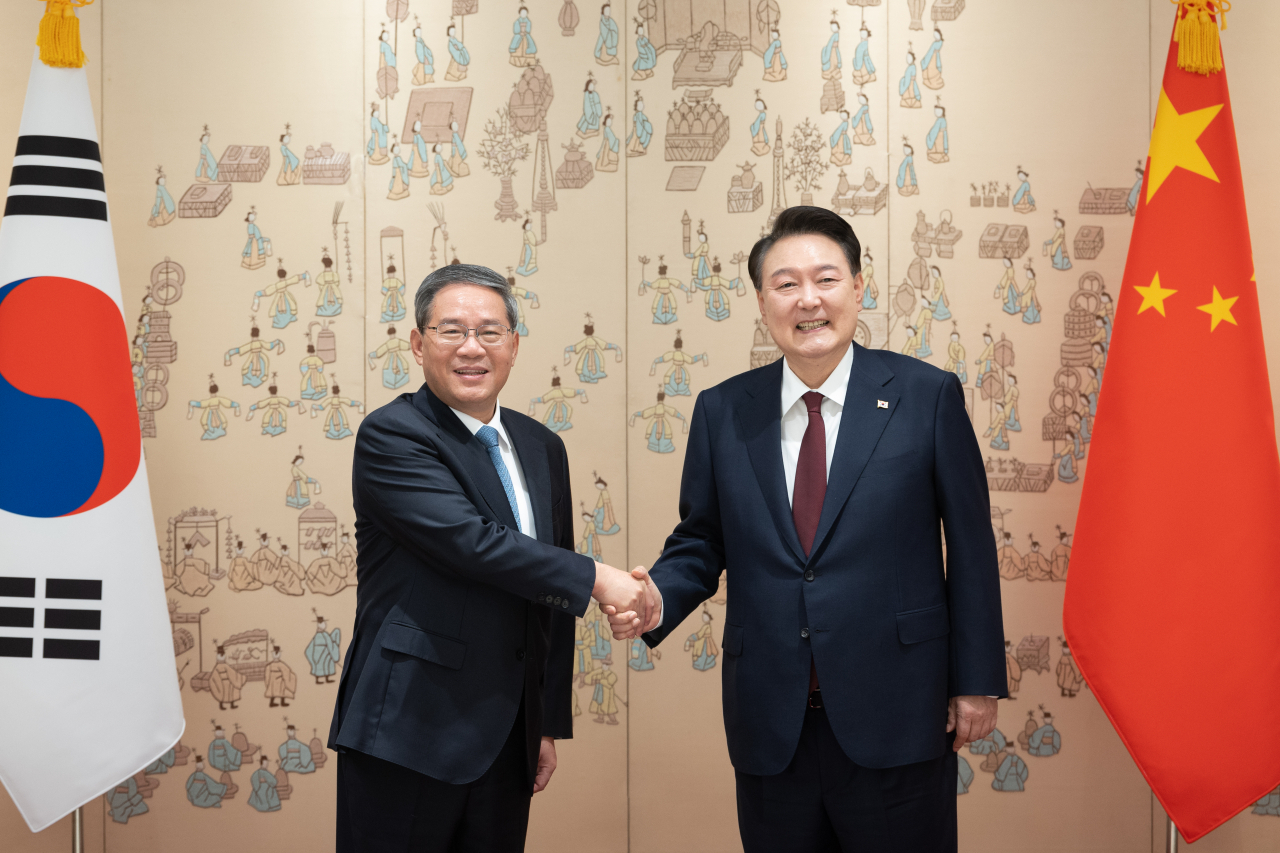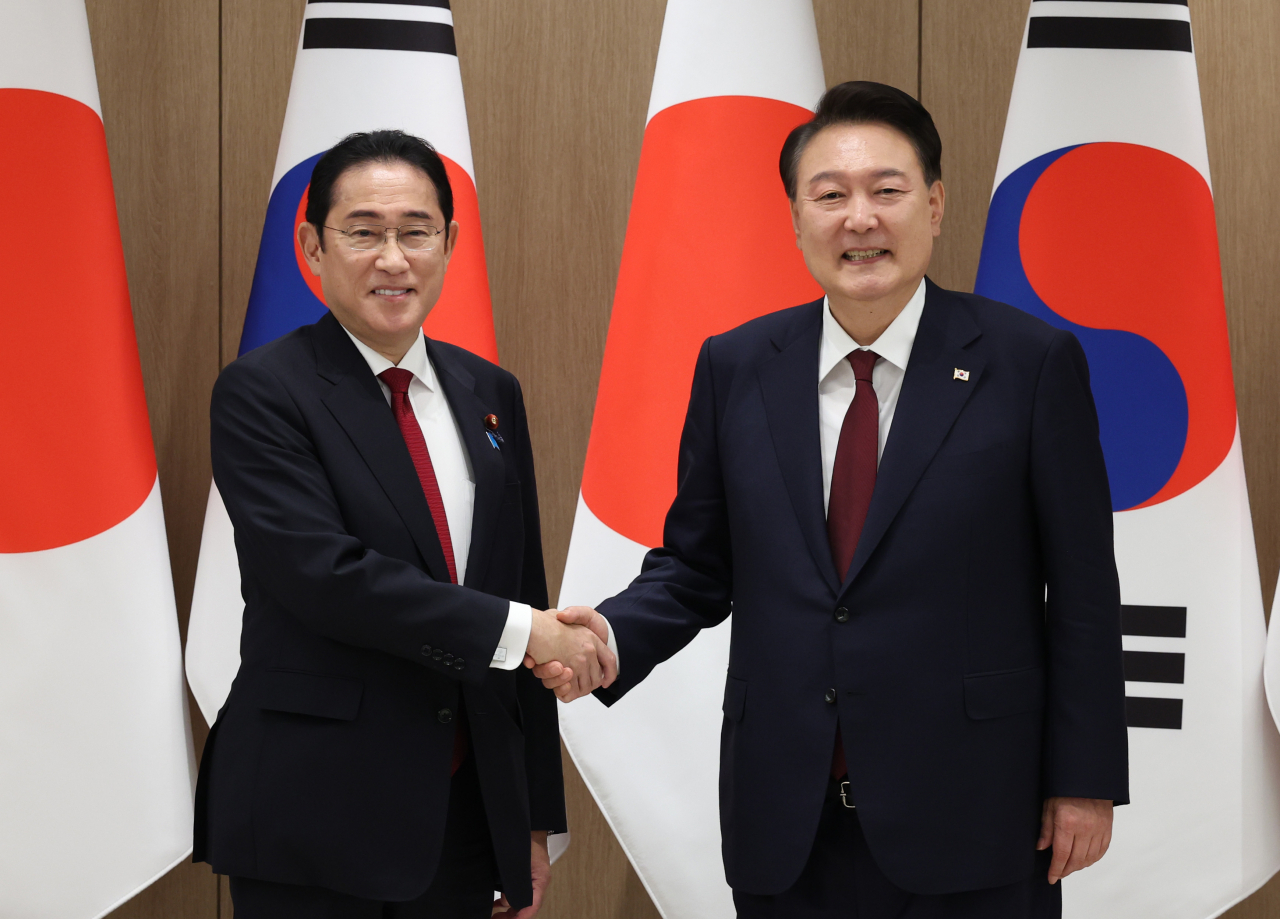
South Korea and China have agreed to create a communication channel for diplomacy and security and resume negotiations on an expanded free trade agreement, the Yoon Suk Yeol presidential office said Sunday.
The two sides have decided to “establish a new high-level dialogue on diplomacy and security, with the first meeting to take place mid-June” and to “open up our markets beyond the trade of goods to include services such as culture and tourism,” a senior Yoon official told reporters.
Yoon held two successive summits with Japanese Prime Minister Fumio Kishida and Chinese Premier Li Qiang on Sunday afternoon in Seoul, ahead of the South Korea-Japan-China summit slated for the next day. Monday’s three-way summit is the first such summit in over four years.
Speaking with Li, Yoon urged China, as a permanent member of the United Nations Security Council, to “play the role of a bastion of peace” against the backdrop of North Korea keeping up nuclear weapons development and military cooperation with Russia.
The South Korean president said in his second meeting with the Chinese premier that he believed the two countries “should work closely not only for our bilateral relations but also for the peace and prosperity in the international community.”
The last time Yoon and Li met was at the 43rd summit of the Association of Southeast Asian Nations in Indonesia last September.
“Recently, our two countries have resumed ministerial dialogues across various fields, and exchanges between municipal governments have been increasing,” he said. “I hope we can continue to strengthen exchanges and cooperation, and respect one another and pursue common interests.”
Yoon went on to add that the “common challenges facing the two countries” were “formidable.”
“As South Korea and China have overcome numerous difficulties together over the past 30 years, contributing to one another’s development and growth, I hope that we will continue to strengthen our bilateral cooperation in the face of global complexities,” he said.
Li, conveying to Yoon regards from the Chinese President Xi Jinping, reciprocated the South Korean president’s message of working together on issues of common interest and building on ties.
“I remember the last time I met with you in Jakarta, you told me that a healthy and good China-South Korea relationship is in the fundamental interests of our two countries,” he said.
“The 30-year history of diplomatic ties between China and South Korea shows our bilateral relations have made rapid progress and achieved rich results, especially in the fields of economy and trade, bringing great benefits to the peoples of our two countries.”
Li said he wished to tell Yoon in particular that the countries have “always upheld mutual respect” and “deepened friendship and mutual respect through equal dialogue and sincere communication.”
He said that he hoped both sides would “cherish the precious experiences ... of mutual growth and prosperity” and continue on that trajectory.
“The Chinese side would like to work together with the Korean side to become good neighbors who can rely on each other and partners who help each other succeed,” he said.
Sunday marks Li’s first South Korea trip after taking office as “Beijing’s No. 2” in March last year. He is also the first Chinese premier to visit Seoul since October 2015, when his predecessor Li Keqiang met with then-South Korean President Park Geun-hye for the fifth time.

In the summit with Kishida that soon followed, Yoon’s remarks were more personal and cordial, referring to himself and the Japanese prime minister as “two of us” at least twice.
“I would like to extend a hearty welcome to Prime Minister Kishida for his first visit to Korea in a year. I am pleased that the prime minister and I have each traveled to one another’s countries twice in the span of about a year,” he said.
Yoon said that he was “especially pleased” to see Kishida in Seoul on the occasion of the South Korea-Japan-China summit.
“Based on the solid trust between the two of us, exchanges at all levels have been greatly enhanced over the past year, and all intergovernmental agreements have been restored as agreed upon by the two of us in Tokyo last March and in Vilnius, Lithuania, last July,” he said.
“This year, we are keeping up high-level exchanges in the areas of finance, industry, and advanced technology.”
The South Korean president noted that in the first quarter of this year, some three million people have traveled between South Korea and Japan. The level of people-to-people exchanges was expected to surpass the previous high of 10.51 million people seen in 2018 by the end of this year, he added.
“I am very pleased that the results of improving bilateral relations are steadily accumulating,” he said.
“I hope that the prime minister and I will work together to build on these achievements so that next year, when we mark the 60th anniversary of the normalization of diplomatic ties between South Korea and Japan, we can reach a historic milestone that can make upgrade our bilateral relations further.”
Kishida, thanking Yoon and the South Korean government for organizing the trilateral summit, began by addressing the robust exchanges that took place between the two over the past year.
“A year ago, as acting prime minister of Japan, I visited Korea for the first time in 12 years. Then afterward, I welcomed President Yoon in Hiroshima. I am very pleased to be able to visit Seoul in this season of fresh verdure,” he said.
“I first held talks with President Yoon in March last year. Since then, I have counted, today’s is our 10th meeting -- face-to-face meeting.”
The Japanese prime minister said he was “very pleased” that he was “continuing to be in close communication with the president, whether it be through conversations, phone calls” beyond in-person meetings.
“We will continue to build on this relationship of trust between the leaders,” he said.
He said that as next year marks the 60th anniversary of the normalization of diplomatic relations with South Korea, he hopes the governments of the two countries could work under their leadership to “enhance our bilateral relations even further.”
Kishida said that the international community was “at a turning point in history,” and that he hoped the two countries “can deepen our cooperation in maintaining and strengthening a free and open Indo-Pacific and in responding to global challenges in an effective way.”





